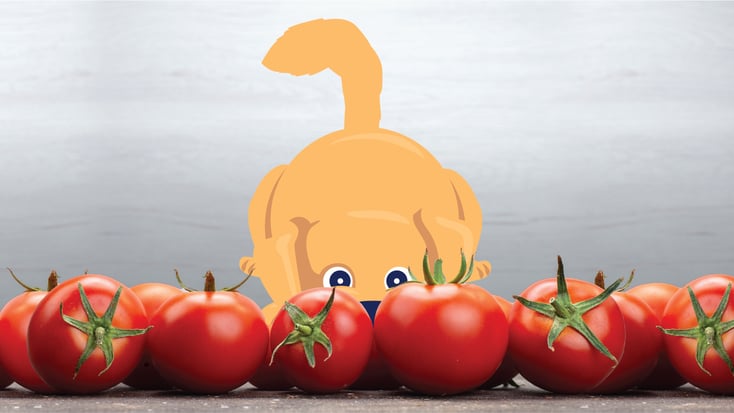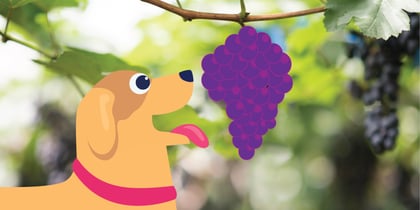Can Dogs Eat Tomatoes?

Table of Contents
As licensed veterinarians, we get tons of questions from pet owners on what types of human food they can give to their dogs. One popular question is: can dogs eat tomatoes?
Whether you're whipping up a salad or munching on a ripe, red tomato from your garden, your curious furry friend might be begging for a bite.
Key Takeaways:
- Dogs can safely consume ripe, red tomatoes in moderation. They offer beneficial nutrients like vitamins C and K, fiber, and potassium.
- The stems, leaves, and unripe (green) tomatoes of the plant contain a substance called solanine, which can be toxic to dogs if consumed in large quantities. Always remove these parts and ensure your dog only eats ripe tomatoes.
- While ripe tomatoes themselves are generally safe, many tomato-based products, such as sauces or soups, often contain ingredients like onions, garlic, and certain spices that are harmful to dogs.
But is it safe? Let's explore the facts and uncover whether this popular fruit belongs in your pup's diet!
Is it Safe for Dogs to Eat Tomatoes?
Yes, dogs can eat tomatoes, but there are some important considerations. Ripe tomatoes are generally safe for dogs in small amounts. They contain beneficial nutrients like vitamin C, potassium, and fiber.
Types of Tomatoes that are Safe for Dogs
When it comes to dogs and tomatoes, the safest option is to offer small amounts of ripe, red tomatoes. These can be a healthy treat for your dog, given their rich supply of beneficial nutrients.
However there are a few other variations of tomatoes that dogs can have, such as:
- Raw tomatoes
- Cooked tomatoes
- Cherry tomatoes
Can Dogs Eat Raw Tomatoes?
Yes, dogs can eat raw tomatoes as long as they are ripe and red. Do not feed your dog unripe or the green parts of tomatoes as they can be toxic.
Can Dogs Eat Cooked Tomatoes?
Yes, dogs can eat cooked tomatoes, but be cautious of what they're cooked with. Many recipes include ingredients like onions, garlic, and certain spices that can be harmful to dogs.
Can Dogs Eat Cherry Tomatoes?
Yes, dogs can eat cherry tomatoes, but they should be ripe and served in moderation. Be aware of the choking hazard cherry tomatoes might pose for smaller dogs and always remove any stems or leaves.
Which Tomato-based Products Can Dogs Eat?
While it is generally advised to only allow dogs to eat the traditional raw, ripe, and red tomatoes, there are a few tomato-based products they may ingest.
Be careful of feeding your dog the following tomato-based products:
- Tomato sauce
- Tomato juice
- Sundried tomatoes
- Ketchup
- Canned tomatoes
- Tomato soup
- Salsa
Can Dogs Eat Tomato Sauce?
While the tomatoes in the sauce are generally safe, many sauces contain ingredients like onions, garlic, and certain herbs that can be harmful to dogs. Always check the ingredients before giving your dog any tomato sauce.
Can Dogs Have Tomato Juice?
Dogs can technically have tomato juice, but it's not typically recommended. Tomato juice can be high in sugar and sodium, both of which can be harmful to dogs in large quantities. Additionally, some tomato juices may contain seasonings like garlic and onions, which are toxic to dogs.
Can Dogs Eat Sundried Tomatoes?
It is not advised to feed dogs sundried tomatoes. While not inherently toxic, sundried tomatoes are typically preserved with high amounts of salt, which can be harmful to dogs if consumed in large quantities. They can also be a choking hazard.
Can Dogs Eat Ketchup?
No, dogs should not eat ketchup. Most commercial ketchups contain high levels of sugar and sodium, which can be unhealthy for dogs. Some may also contain onion or garlic powder, which are toxic to dogs.
Can Dogs Eat Canned Tomatoes?
Yes, dogs can eat canned tomatoes. These are typically safe for dogs, but they often contain high levels of sodium. Always opt for no-salt-added versions if you're considering giving canned tomatoes to your dog.
Can Dogs Eat Tomato Soup?
It depends on the recipe. Similar to tomato sauce, tomato soup often contains ingredients that can be harmful to dogs, such as onions and garlic, and high levels of salt.
Can Dogs Eat Salsa?
No, dogs should not eat salsa. Salsa often contains ingredients harmful to dogs like onions, garlic, and spicy peppers.
In all cases, it's best to consult with a vet before introducing any new foods, including tomatoes and tomato-based products, into your dog's diet.
Remember to introduce any new food gradually and in moderation to avoid any digestive upset.
Are Tomatoes Good for Dogs?
Yes, tomatoes are generally a healthy food for dogs. Tomato fruits contain an abundance of health benefits and are known for the following properties:
- High in fiber
- Contain vitamin C and K
- Source of potassium and folate
- Contain antioxidants such as Lycopene
- Source of Polyphenol, a natural anti-inflammatory
While there may be many health benefits for dogs to eat ripe tomatoes, not all dogs will want to.
Some dogs will not enjoy the taste or texture of tomatoes. If your dog does not like fresh chopped tomatoes, you can offer them in different forms, such as grilled or roasted.
If your dog does not like tomatoes, do not try to force your dog to eat them, as there are many other foods your dog may enjoy instead.
Are Tomato Plants Toxic to Dogs?
Yes, unripe tomatoes (green tomatoes) or the green parts of the tomato plant (leaves, stems, etc.) contain a substance called solanine, which can be toxic to dogs if consumed in large amounts.
As a preventive measure, keep tomato plants out of reach or in a fenced-off area to ensure your dog can't access them.
Signs of Tomato Poisoning in Dogs
If your dog has ingested a significant amount of the green parts of a tomato plant or unripe tomatoes, they may exhibit signs of solanine poisoning, which can include:
- Gastrointestinal upset: This can include vomiting, diarrhea, or abdominal pain.
- Lethargy: Your dog may seem unusually tired or uninterested in activities they usually enjoy.
- Weakness: They may seem physically weak, have difficulty standing or moving, or exhibit poor coordination.
- Confusion: Your dog may seem disoriented or confused.
- Changes in behavior: This can include agitation, restlessness, or other unusual behaviors.
- Dilated pupils: This is a sign of a more severe reaction and requires immediate veterinary attention.
- Slow heart rate: This is another sign of a severe reaction.
If you notice any of these symptoms in your dog after they've been around tomato plants or unripe tomatoes, contact your veterinarian immediately.
While solanine poisoning is typically not fatal, it can be serious and requires prompt veterinary attention.
Should My Pet Be Seen by a Veterinarian?
1. Have you noticed changes in your pet’s appetite?
2. Does your pet have diarrhea or loose stools?
3. Have you noticed changes in your pet’s thirst/water consumption?
4. Is your pet having accidents in the house?
5. Is your pet pacing and unable to settle?
6. Is your pet panting more than usual?
7. Is your pet whining or vocalizing more than usual?
8. Is your pet shaking more than usual?
9. Is your pet hiding or avoiding physical contact more than usual?
10. Is your pet more lethargic and sleeping more than usual?
11. Are you concerned about changes in your pet’s behavior?
12. Is your pet scratching their ears?
13. Is your pet licking their paws more than usual?
14. Does your pet have a rash?
15. Is your pet moving more slowly than usual or having a harder time getting up or down?
View Results
Should My Pet Be Seen by a Veterinarian?
1. Have you noticed changes in your pet’s appetite?
2. Does your pet have diarrhea or loose stools?
3. Have you noticed changes in your pet’s thirst/water consumption?
4. Is your pet having accidents in the house?
5. Is your pet pacing and unable to settle?
6. Is your pet panting more than usual?
7. Is your pet whining or vocalizing more than usual?
8. Is your pet shaking more than usual?
9. Is your pet hiding or avoiding physical contact more than usual?
10. Is your pet more lethargic and sleeping more than usual?
11. Are you concerned about changes in your pet’s behavior?
12. Is your pet scratching their ears?
13. Is your pet licking their paws more than usual?
14. Does your pet have a rash?
15. Is your pet moving more slowly than usual or having a harder time getting up or down?
Share Quiz
Conclusion
To summarize, dogs can eat red tomatoes in small amounts. They should avoid green tomatoes, the vines, and the leaves of the tomato plant, as they can cause toxicity in dogs.
Tomatoes can be a nutritious, healthy snack or meal topper for your dog.
Avoid feeding tomatoes mixed in sauces such as pasta or curry mixes, as the tomato-based sauces are often mixed with other flavorings that can be toxic to dogs.
If you are unsure whether you can feed your dog a specific food item, or want help creating a diet plan for your dog, reach out to your veterinarian for a comprehensive pet nutrition consultation.






